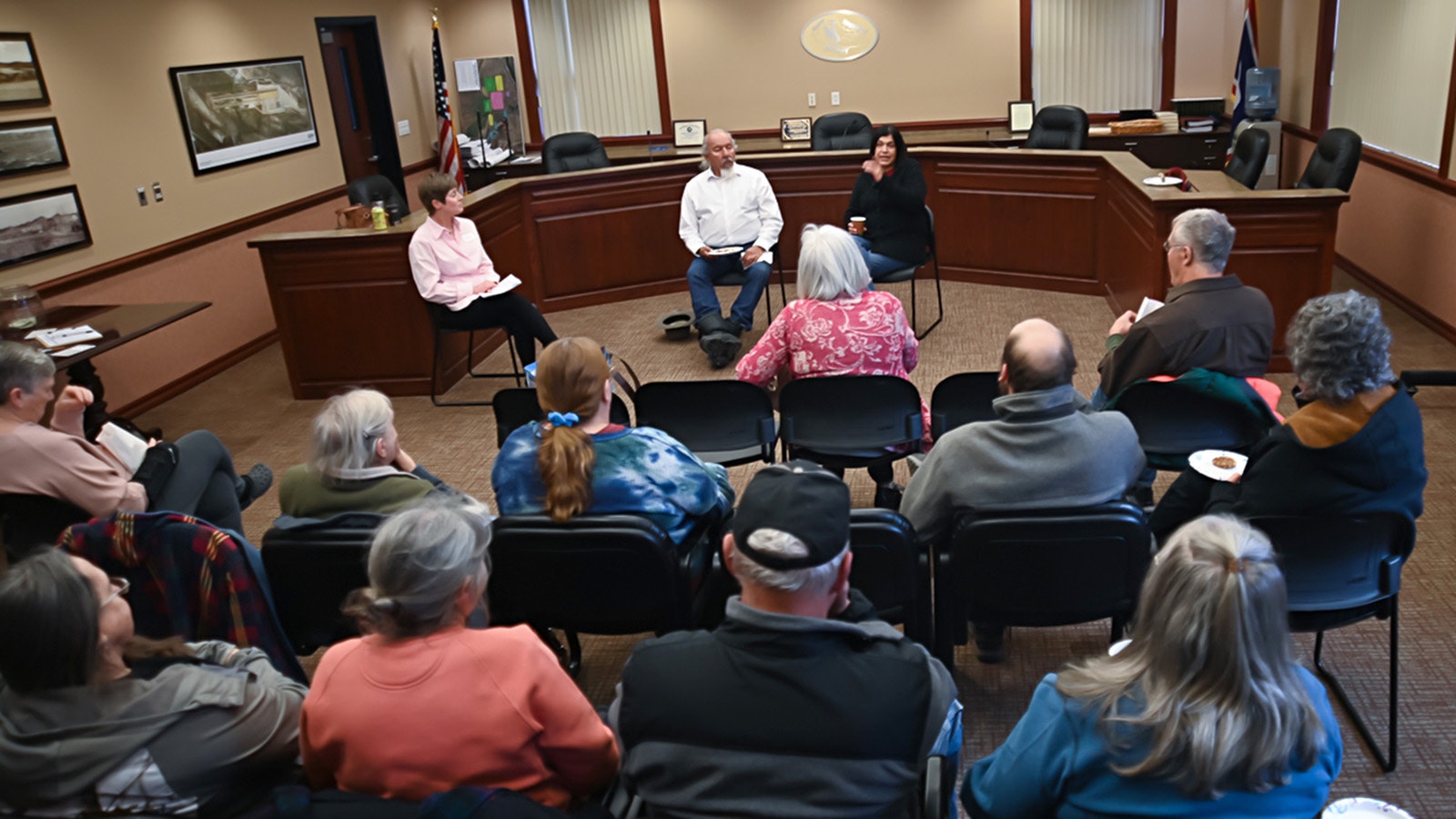In an era where divisiveness and political partisanship seems to have hit a crescendo, the Hot Springs County Republican and Democratic parties are outliers.
Over the last few months, members of the local parties have been attending each other’s public speaking events, making a legitimate effort to bridge understanding and connection between them.
That Republicans and Democrats in Wyoming can get along may not be unprecedented, but it says something about the current political climate that members of opposing parties not fighting each other is news.
“I am absolutely pleased that we are being able to work well together,” said Kim Bartlett, chair of the Hot Springs County Democratic Party. “I am happy to see more members of our community are having conversations with each other regardless of political affiliation. I think that is a very promising development.”
Collaboration Put To The Test
The political melting pot was tested in late February when college professor and 2022 Republican Superintendent of Public Instruction candidate Tom Kelly gave a “Wokeness in Wyoming Schools” presentation. The room of roughly 60 attendees was split about evenly between Democrats and Republicans.
The night hit a rough spot about halfway through Kelly’s speech when someone in the audience started interrupting him to repeatedly ask what “woke” means. People supporting and opposing the audience member then chimed in, causing a short moment of disruption.
Kelly eventually moved on, and by the end of the evening was able to conduct a productive question and answer session where he answered hard-pressing inquiries from the audience.
If the same questions had been asked in a different setting or possibly even earlier in the evening, they may have elicited a much more combative response.
“Everyone in the room was nodding their heads by the end,” said Cheryl Aguiar, chair of the Hot Springs County GOP.
Bartlett commended Kelly for remaining nonpartisan in his presentation despite holding strong Republican and Libertarian convictions.
“We’re really excited about that dialogue,” she said.
Bartlett said there had been efforts to co-host speaking engagements in the past, but those plans didn’t happen until Aguiar was elected chair. She hopes the engagements will help the parties better understand opposing viewpoints rather than use them as weapons in one-sided debates.
“We all get along together pretty well,” Aguiar said.
Bartlett said there has also been discussions about hosting community service projects together in the future such as voter registration efforts.

Don’t Have To Agree On Everything
Although their viewpoints may be vastly different on political issues, both party chairs agree that educating the community transcends partisanship.
“We’re not necessarily trying to change people’s minds, we’re just having those discussions and letting people use their voice,” Bartlett said.
At one point in his presentation, Kelly asked the audience if they find people who disagree with their viewpoints as stupid or evil.
“Everyone dropped their heads,” he said.
Aguiar said members from both parties continued talking for hours after Kelly finished, giving the event a feeling of “a wedding party.”
“We need to listen to each other, not just the media,” she said.
Another Republican event this spring hosted a discussion on property taxes, and a Democratic-hosted Mardi Gras get-together featured the new Thermopolis mayor.
On April 5, the Democrats hosted a “Wyoming Politics: A Native Perspective” event featuring former Democratic state legislator Andi LeBeau and former Democratic Superintendent of Public Instruction candidate Sergio Maldonado.
Aguiar was one of a number of Republicans who attended, saying she was impressed with both.

Fighting Polarization
The cornerstone behind these events is to spark conversations between two groups of people that have become increasingly polarized in recent years. Since 2000, most of America’s blue-leaning states have become bluer, while red states like Wyoming have become redder.
Democratic numbers have greatly dwindled in Wyoming from slightly less than half of the state’s residents in the past, to about 25% today.
The topic of former congresswoman Liz Cheney was a particularly prickly one in Wyoming last year, with many Republicans outraged that Democrats would support and attempt to vote for her.
For many, the Cheney question came down to support for or opposition of former President Donald Trump, who Cheney denounced. Few have passive opinions on Trump, who got more support from Wyoming than any other state in 2020.
Some, like conservative firebrand congresswoman Marjorie Taylor Greene of Georgia, seem to be throwing up their hands when it comes to bridging the partisan divide, advocating for a “national divorce” separated by red and blue states.
Bartlett, a former Republican, said she has concerns Wyoming will become a one-party state.
“That does not represent democracy,” she said. “That’s not America. In America, we all have different opinions and views and we have the freedom to express those.
“We don’t have to agree with each other, but we do have to respect each other’s opinions and differences. Having these discussions really helps that.”
Yet everyday issues facing most Americans, especially in rural America, rarely fall upon purely Democratic or Republican lines. One thing most Democrats and Republicans in Hot Springs can likely agree on is a love for their community and state.
“We all love our community, our town, our state,” Bartlett said. “We just have different ideas about how to improve it.”
The next Hot Springs GOP event will be on April 25 when former Republican gubernatorial candidate Brent Bien will speak. The next Democratic event will cover LGBTQ issues on June 7.





